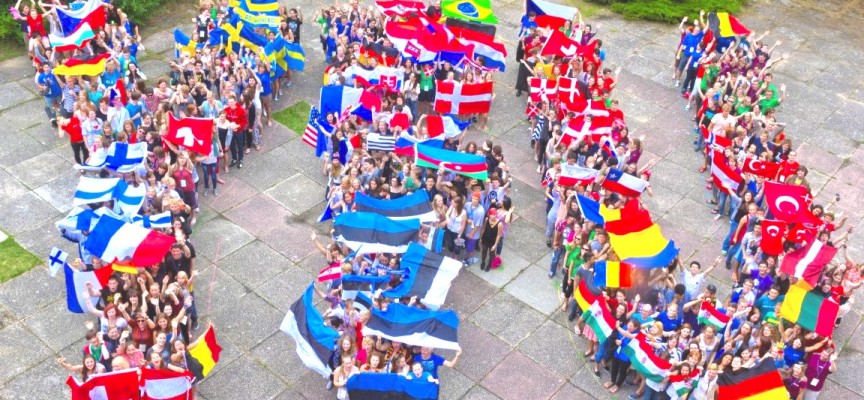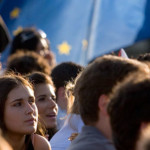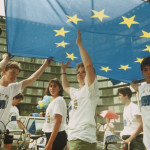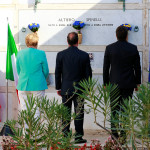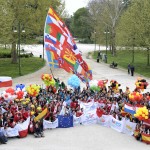“The way to go through isn’t simple, it isn’t even safe. But you have to go through it and it will be that way!” (Altiero Spinelli)
We, as italians, are always very proud of our successes, but we are not able to remember. A few days ago, the article of one of the most known Italian journalist, Beppe Severgnini, remembered a fundamental moment for the political history of the whole world. To stimulate memory means, in this case, what happened in the ’40s during Mussolini’s dictatorship in an island of Lazio.
In the ’39 Altiero Spinelli, Ernesto Rossi and Eugenio Colorni were knowing each other, they were 3 antifascist but most of all they were visionaries. The first two of them are nowadays known as the founding fathers of the European Union, and so, maybe, they weren’t visionaries. In 1948 the result of their collaboration took the name of “For a free and unit Europe”, a long and clandestine work, that was also the first official document in which the institution of a federalist European Union was planned. Spinelli and Rossi reamed an unique coin, an unique army, an unique European foreign policy: for these reasons, the manifesto is considered to be the text that founded the EU.
Being this a completely “made in Italy” product, we are marveled that this great inheritance isn’t taken seriously by the place where it actually came to birth. Le Pen’s successes, Grillo’s jokes, Cameron’s occlusion and Berlusconi’s chatting damage the trust on this project, which is extremely necessary to carry on and wonderful to pursue. Without EU we won’t go any further and, Mr Severgnini, we guarantee you that there are people who know this. Is not only the Erasmus generation, but also all of those who came after EU and do not really know how to do without it. We, as young people, developed a different way of living, that is not Italian but European.
We are now use to consider ourselves as European citizens and for this reason we would like to understand why there is no dialogue between those against and pro European Union. In particular those pro Europe are not able to give answers to their rivals, but is it really that difficult? Maybe it is, but only for those who didn’t tasted, saw and experienced Europe yet. The adversary’s matters are full of passion. “Those who believe in it” was our article last week, and those who believe in it are those who have the strength and the potentiality to stop the growing of the euro skepticism which has no reason to exist, as Severgnini have remembered. At the same time the first Erasmus generation should have already developed the acquaintance (and the age) to contrast them, so, maybe there is a reason.
The EU have deceived them and then have betrayed them? Someone for sure, but we are at the beginning of something that will mature. So who will take this inheritance? We will. Because we are those who find customs only in America or in Australia, those who watch the other states in war and benefit from our peace. That peace, which a Continent that is trying to become younger, have built star after star. We know that the EU is necessary, as well, to give voice to little States such as Italy for example. We will because we know that we represent a dream for someone else. Courage and passion aren’t the dreamer’s talents, but the visionaries’. Because between a dreamers and visionaries there is a limit. The visionaries have a prospective to realize. And if we don’t understand what we could reach, what we are allowed to do, the freedom that we own and the prospective that are opened in front of us thanks to a new way of look at things, think, reflect, we will lose part of this culture that is growing big, multilingual, eclectic, different and unique.
A unit culture, which lets humanity progress, offering something new, never seen before. Also those who are against Europe avail of this benefits that our Union offer us, so, why do they keep talking that much?
“La via da percorrere non è facile, né sicura. Ma deve essere percorsa, e lo sarà!” (Altiero Spinelli, Manifesto di Ventotene)
Noi italiani andiamo sempre molto fieri dei nostri successi, ma non abbiamo la capacità di ricordare. Qualche giorno fa, l’articolo di un celebre giornalista italiano, Beppe Severgnini, ha estratto dal passato un momento fondamentale per la storia politica di tutto il pianeta. Stuzzicare la memoria, questa volta, significa ricordare che cosa successe negli anni quaranta, gli anni di Mussolini, su un’isoletta del Lazio.
Nel 1939, infatti, a Ventotene stringevano amicizia Altiero Spinelli, Ernesto Rossi e Eugenio Colorni: tre antifascisti che erano anche dei visionari. I primi due sono considerati i padri fondatori dell’Unione Europea, e quindi, forse, così visionari non erano. Nel 1948 il frutto della loro collaborazione prendeva il nome di “Per un’Europa libera e unita”, un lavoro lungo e clandestino, che era anche il primo documento ufficiale in cui si prefigurava la necessità dell’istituzione di un’Unione europea di tipo federalista. Spinelli e Rossi immaginavano una moneta unica, un esercito unico, una politica estera unica europea: per questi motivi il manifesto è considerato il testo fondante dell’Ue.
Essendo quindi, questo, un prodotto interamente made in Italy, stupisce che una così immensa eredità non abbia, proprio dove è nata, persone in grado di raccoglierla. Ma in generale, il malumore nei confronti dell’Ue sembra conquistare fasce sempre più larghe di popolazione. I successi dei Le Pen, le battute dei Grillo, l’occlusione dei Cameron e le chiacchiere dei Berlusconi minano la fiducia in un progetto che non solo è strettamente necessario portare avanti, ma che è anche meraviglioso da inseguire. Senza Ue non si va da nessuna parte e, signor Severgnini, le assicuriamo che qualcuno che lo sa c’è. Non è solo la prima generazione Erasmus, ma tutti quelli che sono venuti dopo e che dell’Ue, davvero, non saprebbero fare a meno.
Noi ragazzi abbiamo sviluppato un modo di vivere non italiano, bensì europeo, siamo abituati a considerarci cittadini dell’Unione e per questo è necessario chiedersi perché gli europeisti non rispondono a tono agli anti-europeisti. È così difficile smontare le loro convinzioni? Forse lo è, ma solo per quelli che l’Unione Europea non l’hanno ancora assaggiata, vista, vissuta. I discorsi degli avversari sono carichi di foga. “Quelli che ci credono” era il nostro articolo della scorsa settimana, e quelli che ci credono sono quelli che hanno la forza e le potenzialità di fermare l’avanzata di un euroscetticismo che non ha motivo di esistere, come ha ricordato sempre Severgnini. Al tempo stesso, la prima generazione Erasmus dovrebbe ormai aver sviluppato le conoscenze (e l’età) per arrivare a contestarli, quindi, se non lo stanno facendo, forse un motivo c’è.
L’Ue li ha illusi per poi deluderli? Qualcuno sicuramente sì, ma siamo solo all’inizio di qualcosa che col tempo maturerà. Chi può raccoglierla, l’eredità? Noi. Noi che le dogane le vediamo in America o in Australia. Noi che guardiamo gli altri stati in guerra e beneficiamo della pace che un continente che prova a svecchiarsi ha costruito stella dopo stella. Noi che sappiamo che l’Ue serve anche per dare voce alle piccole nazioni, come l’Italia per esempio. Noi che rappresentiamo un sogno per altri. Il coraggio e la passione non sono le doti dei sognatori, ma dei visionari. Perché tra sognatore e visionario il confine c’è. Il visionario ha una prospettiva da realizzare. Se non ci rendiamo conto di tutto ciò che possiamo permetterci, della libertà di cui godiamo e delle prospettive che ci apre questo nuovo modo di vedere, pensare, ragionare finiremo per perdere parte di una cultura che sta sbocciando ed è grande, multilingue, eclettica, diversa, unica. Una cultura unita, che fa progredire l’umanità proponendo qualcosa di nuovo, mai visto prima.
Anche gli antieuropeisti usufruiscono dei benefici che la nostra unione ci offre e, quindi, perché chiacchierano così tanto?
Giovani Giornalisti
Latest posts by Giovani Giornalisti (see all)
- Erasmus? Then I’ll hire you - 31 ottobre 2014
- Young, yeast for Europe - 26 settembre 2014
- First elections for the “Millennials” - 12 maggio 2014

